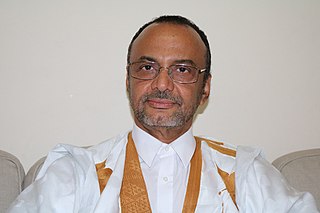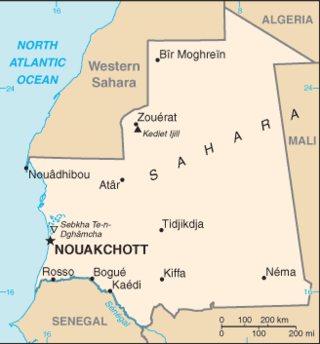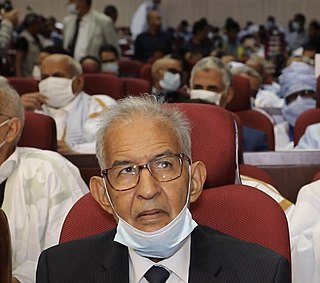| |||||
| Decades: | |||||
|---|---|---|---|---|---|
| See also: | |||||
This article is a list of events in the year 2003 in Mauritania.
| |||||
| Decades: | |||||
|---|---|---|---|---|---|
| See also: | |||||
This article is a list of events in the year 2003 in Mauritania.

Mauritania is a presidential democracy, but has suffered from repeated military coups since its Independence in November 1960. For 18 years after independence, Mauritania was a one-party state under Moktar Ould Daddah. This was followed by decades of military rule. The first fully democratic presidential election in Mauritania occurred on 11 March 2007, which marked a transfer from military to civilian rule following the military coup in 2005. The election was won by Sidi Ould Cheikh Abdallahi, who was ousted by another military coup in 2008 and replaced by general Mohamed Ould Abdel Aziz. Mauretania underwent its first peaceful transition of power after the 2019 presidential election, although this was between two presidents of the ruling UPR party and former army generals.

Presidential elections were held in Mauritania on 7 November 2003. As expected, incumbent President Maaouya Ould Sid'Ahmed Taya was easily re-elected against weak opposition. The opposition alleged election fraud, and Ould Taya's main challenger, former military ruler Mohamed Khouna Ould Haidalla, was arrested both immediately before and after the vote. The elections saw two notable firsts; Aicha Bint Jeddane was the country's first female presidential candidate, and Messaoud Ould Boulkheir was the first descendant of slaves to run for the office.

The Union for Democracy and Progress is a political party in Mauritania. The UDP is led by Naha Mint Mouknass. As of 2023, the UDP has 10 seats in the National Assembly of Mauritania.
The Popular Front is a small political party in Mauritania.

Col. Mohamed Khouna Ould Haidalla was the head of state of Mauritania from 4 January 1980 to 12 December 1984.

The Military Council for Justice and Democracy was a supreme political body of Mauritania. It served as the country's interim government following the coup d'état which ousted the President Maaouya Ould Sid'Ahmed Taya on 3 August 2005. It was led by the former Director of the national police force, Colonel Ely Ould Mohamed Vall. After seizing power, it quickly pledged to hold elections within two years and promised that none of its own members would run.

Sidi Mohamed Ould Boubacar is a Mauritanian politician who has been Prime Minister of Mauritania twice, from 1992 to 1996 and again from 2005 to 2007.

A military coup took place in Mauritania on 3 August 2005. President Maaouya Ould Sid'Ahmed Taya was ousted by the Armed Forces of Mauritania and replaced by the Military Council for Justice and Democracy (CMJD), headed by Ely Ould Mohamed Vall, while Taya was in Saudi Arabia attending the funeral of King Fahd of Saudi Arabia.

Ahmed Ould Daddah is a Mauritanian economist and a politician. He is a half-brother of Moktar Ould Daddah, the first President of Mauritania, and belongs to the Marabout Ouled Birri tribe. He is currently the President of the Rally of Democratic Forces (RFD) and was designated as the official Leader of the opposition following the 2007 presidential election, in which he placed second.

The Military Committee for National Salvation was a military Government of Mauritania that took power in the 1979 coup d'état. It was installed by Mohamed Khouna Ould Haidalla, Ahmed Ould Bouceif and fellow officers, in an internal regime/military coup on April 6, 1979, removing Colonel Mustafa Ould Salek of the Military Committee for National Recovery (CMRN) from effective power. He was officially replaced by Mohamed Mahmoud Ould Louly in June 1979. Haidalla would later emerge as the main military strongman and go on to assume full powers in the 1980 coup d'état, only to be deposed by Colonel Maaouya Ould Sid'Ahmed Taya in the December 1984 coup d'état.
The People's Progressive Alliance is a small political party in Mauritania.
In December 1984, Haidallah was deposed by Colonel Maaouya Ould Sid'Ahmed Taya, who, while retaining tight military control, relaxed the political climate. Ould Taya moderated Mauritania's previous pro-Algerian stance, and re-established ties with Morocco during the late 1980s. He deepened these ties during the late 1990s and early 2000s as part of Mauritania's drive to attract support from Western states and Western-aligned Arab states. Mauritania has not rescinded its recognition of Polisario's Western Saharan exile government and remains on good terms with Algeria. Its position on the Western Sahara conflict has been, since the 1980s, one of strict neutrality.
Mohamed Lemine Ould Guig is a Mauritanian academic and political figure. He was the 8th Prime Minister of Mauritania from December 18, 1997, to November 16, 1998.

Ba Mamadou dit Mbaré was a Mauritanian politician who served as President of the Senate of Mauritania from 2006 until his death. As President of the Senate, he succeeded Mohamed Ould Abdel Aziz as Head of State on 15 April 2009, when Abdel Aziz resigned to take part in the June 2009 presidential election. Abdel Aziz was then elected president and in turn succeeded Mbaré on 5 August 2009.

Israel and Mauritania relations refers to the historic and current bilateral relationship between Israel and Mauritania. Mauritania declared war on Israel as part of the Six Day War. In 1999, Mauritania became the third member of the Arab League—after Egypt and Jordan—to recognize Israel as a sovereign state. However, after the Gaza War, Mauritania severed all relations by March 2010.
Mohamed Lemine Ch'bih Ould Cheikh Malainine is a Mauritanian politician. He has served as a former leader of the Qadiriyya Islamic brotherhood.

The 1984 Mauritanian coup d'état was a bloodless military coup in Mauritania which took place on 12 December 1984.

Mohamed Ould Cheikh Mohamed Ahmed Ould Ghazouani, also known as Ghazouani and Ould Ghazouani, is a Mauritanian politician and retired army general who has served as the 9th President of Mauritania since 2019, and the chairperson of the African Union since February 2024.

The 2003 Mauritanian coup d'état attempt was a violent military coup attempt in Mauritania which took place on 8–9 June 2003.